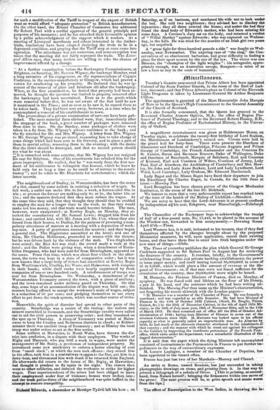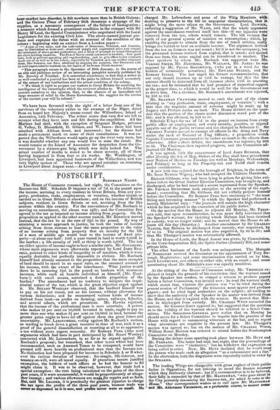Iftistellantous.
Tuesday's Gazette announced that Prince Albert has been appointed Colonel of the Scots Fusileer Guards, in the room of the Earl of Lud- low, deceased ; and that Prince Albert's place as Colonel of the Eleventh Light Dragoons is taken by Lieutenant-General Sir Arthur Benjamin Clifton.
The appointment is gazetted of the Most Honourable John Marquis of Bute to be the Queen's High Commissioner to the General Assembly of the Church of Scotland.
It is also formally announced, that the Queen has granted to the Reverend Charles Atmore Ogilvie, M.A., the office of Regius Pro- fessor of Pastoral Theology, and to the Reverend Robert Hussey, B.D., the office of Regius Professor of Ecclesiastical History, in the Univer- sity of Oxford.
A magnificent entertainment was given at Holdernesse House on Tuesday night, to celebrate the twenty-first birthday of Lord Seal:am, the Marchioness of Londonderry's second son. Covers were laid in the grand hall for forty-four. There were present the Dutchess of Gloucester and Dutchess of Cambridge, Princess Augusta and Prince George of Cambridge, the French Ambassador and the Countess De St. Aulaire, Baron and Baroness Branow, Duke of Wellington, Duke and Dutchess of Baccleuch, Marquis of Salisbury, Earl and Countess of Kinnoul, Earl and Countess of Wilton, Countess of Jersey, Lady Peel, Earl of Aberdeen, the Archbishop of Canterbury and Mrs. How- ley, Sir John and Lady Anne Beckett, Lord and Lady Lyndhurst, Lord Ward, Lord Cantalupe, Lady Graham, Mr. Edmund Macdonnell.
Lady Bagot and the Misses Bagot have fixed their departure to join his Excellency Sir Charles Begot, in Canada, for the 10th June at latest.—Morning Post.
Lord Brougham has been chosen patron of the Glasgow Mechanics' Institution, in the room of the late Dr. Birkbeek.
We lament to state that a very unfavourable report has reached town of the state of the health of the Bishop of Lichfield.—Standard.
We are sorry to hear that the Lord-Advocate is at present confined by indisposition ati his seat, Eskgrove, near Musselburgh.—Edinburgh Post.
The Chancellor of the Exchequer begs to acknowledge the receipt of half of a five-pound note, No. 17,443, to be placed to the account of the Window-tax, forwarded to him anonymously.— Downing Street April 27th.— Times.
Lord Western has, it is said, intimated to his tenants, that if they find' themselves affected by the changes brought about by the proposed• Ministerial measures, he will, upon application, cancel their existing leases, and thus leave them free to enter into fresh bargains under the new state of things.—Globe.
The Times of yesterday publishes the plan which General Sir George Cockburn suggested to Sir Robert Peel in August last for retrieving
the finances of the country. It consists, briefly, in the Governmenet withdrawing from public and private banking establishments the power to issue paper money, and itself issuing instead 30,000,000/. in notes of
5/. to 3,0001., which would place a like amount of revenue at the dis- posal of Government; or, if that sum were not found sufficient for the circulation of the country, then 20,000,0001. more might be issued.
M. Humann, the Finance Minister of France, died on Monday, of apoplexy. He was found cold and lifeless on the floor of his library,
a pen in his hand, and the sentence which he had been writing un- finished. The Morning Post thus sums up the Minister's characteristics, not forgetting his recent skirmish with the London papers- " M. Hamann was a member of the Chamber of Peers. He was formerly a merchant ; and was regarded as an able financier. He had been Minister of
Finance in the 11th of October 1832 Cabinet, (Soult, De Broglie Thiers, Guizot, &c.) in the 25th of December Cabinet, in the 4th of April ;834 Mi- nistry, in the 18th of July same year, 18th of November ditto, and in the 11th of March 1835. He then remained out of office till the 29th of October Ad-
ministration of 1840; haviug been Minister of Finance in seven out of the nineteen Cabinets since 1830. M. Hamann was looked upon in his official capacity as what is generally called an impracticable man. An Alsaciau by birth, he had much of the obstinate character attributed to the inhabitants of that country ; and the manner with which he stood out against his colleagues. in the Cabinet, by supporting the inordinate pretensions of the French Post- office, which came under his department, was a remarkable illustration of this . dogged determination." It is said that the paper which the dying Minister left uncompleted consisted of instructions to the Postmasters in France to put further im- pediments in the way of extraordinary expresses.
M. Laeave Laplagne, a member of the Chamber of Deputies, has been appointed to the vacant office.
France has just lost two of her Marshals—Moneey and Clausel.
An artist at Rome, named Roudoin, has just succeeded in taking photographic drawings on stone, and printing from it. In that way he printed a lithograph of a nebula of Orion. [This is printing, at second- hand, from Nature herself; bringing the firmament within one move of the press I The next process will be, to print speech and music warm from the lips.1
The effect of Emancipation in the West Indies, in throwing the la- boar-market into disorder, is felt nowhere more than in British Guiana; and the Guiana Time.s of February 28th threatens a stoppage of the supplies, as a necessary consequence of the failure of immigration ; a measure which formed a prominent condition in the compact with Sir Henry M`Leod, the Special Commissioner who negotiated with the Local Legislature for the existing Civil List. The above-named journal pre- faces and explains the threat with an account of the condition of the colony ; beginning with an extract from a London paper-
- ' A year or two more, and the cultivation of Demerara, Trinidad, and Jamaica, may be diminished or destroyed; straitened supply and augmented price may compel the admission of slave-grown productions, and a shout of triumph be raised throughout the slave-holding countries. Thefrrni of Goverament assistance is twofold. - first, good laws, both to prevent squatting and vagabondizing. and to give effect to fair contracts made out of as well as in the colony. especially Tur Trinidad, as it can neither originate Ahem, like Jamaica, nor force attention by stopping the supplies, like Demerara with its half-representative institutLns, the legacy of its former Dutch masters.'
"This paragraph occurs in the Spectator of 49th January, in the course of an able and judicious review of an interesting pamphlet recently published by Mr. Burnley of Trinidad. It is somewhat consolatory to find that a writer in so well-conducted a journal has been at the pains to inform himself accurately of the nature of our institutions and the actual condition of the colony.
"We think it right to prepare our readers in Great Britain for receiving the intelligence of the catastrophe which the reviewer alludes to. We deliberately commit ourselves to the opinion, that, in the absence of an immediate and large measure of relief by the Home Government, the supplies for the service of the current year will be refused."
We have been 'favoured with the sight of a letter from one of the survivors of the voluntary exiles to the swamps of the Niger, dated from on board her Majesty's steam-vessel the Wilberforce, Island of Ascension, 14th February. The writer states that very few are left to recount what they have seen and felt during the expedition. All the Marines had died, with the exception of Sergeant Hodges, privates G. Velley, D. Bloomfield, H. Gibson, and W. Innes : these had been attacked with African fever, and recovered ; but the disease had made a permanent mark on some of their constitutions. It was ex- pected that the Wilberforce would again go up the river very soon, but it was doubtful whether any one would live to state the result. She would remain at the Island of Ascension for despatches from the Go- vernment by a sixteen-gun brig, which was daily looked for. The actual number of deaths is stated to be about seventy, all of them having happened in from four to six weeks. Mr. Waddington, of Liverpool, had been appointed boatswain of the Wilberforce, and was very highly spoken of. Those who are spared calculate on returning to Liverpool about August next.—Liverpool Maid



























 Previous page
Previous page